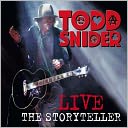Rock & Roll &
Preaching Agnosticism (with Laugh Lines)
 |
 |
 |
 |
 |
Usually Manahattan's Irving Plaza is a stand-up venue, but the folding chairs were out March 8 for fans of East Nashville singer-songwriter Todd Snider. These were predominantly but not overwhelmingly male, guys who could easily populate a bar scene in My Name Is Earl and look to average a few years younger than the 45-year-old they always come out to see. After two decades of performing mostly solo, Snider is touring with the same terrific band that gives his Agnostic Hymns & Stoner Fables extra bite and body. Three of his first five selections were from that album, which had been out all of three days. Every one of the five was about class struggle.
Not that those fortysomethings were seeking political enlightenment. Snider makes a living on the road primarily because he's the finest natural comedian in music today. His foundational hits are a grunge joke he's left behind, the fortysomething apologia "Alright Guy," and the one most newbies notice, "Beer Run," the saga of two underage frat boys looking to get drunk at a Robert Earl Keen concert. But the songs that began the show, while still funny, were considerably less jovial. "In the Beginning" traces the roots of theism to a foiled Paleolithic attempt to revolt against the first rich guy. "Too Soon to Tell" ponders the eternal prospects of a recently fired screw-up who has more immediate concerns: "They say living well is the best revenge / I say bullshit, the best revenge is revenge." In "The Devil You Know," Snider gives his car keys to a young black bank robber fleeing the police and holds the money for him. "Precious Little Miracles" is a tongue-in-cheek attack on teenagers who wear their pants too low, kill for thrills, and won't pick up garbage in the park. And in "Lookin' for a Job," a drywall-hanging ex-con warns his boss to show some respect: "Broke won't take much getting used to / Neither will a barbwire jailhouse wall / Watch what you say to someone with nothing / It's almost like having it all."
Snider grew up in Oregon, took up the harmonica, and drifted to Austin after college. There he was inspired by the folksinger Jerry Jeff Walker to learn guitar and embark on a career whose beginnings he recounts with more hilarity than reliability on his 2003 live album Near Truths and Hotel Rooms. An anxiety-prone insomniac with a deep fondness for marijuana and red wine, he has whole routines mocking his prowess on the guitar. But he always wrote with the kind of colloquial simplicity that seems so off-the-cuff and isn't, always charmed with a live-and-let-live drawl he wasn't born to, and always attracted supporters more together and famous than he is. Fellow artists you can understand--his first label was Jimmy Buffett's Margaritaville, his second John Prine's Oh Boy. But that Cokie Roberts should write this barefoot stoner's press bio or Rahm Emanuel hip him to the Goldman Sachs Abacus Fund, whose name he names in "New York Banker," suggests he could get larger.
Snider's career split down the middle circa 2003. The airplay-targeted production of his early recordings undersold the personality that made him worth signing, so that the five songs his first live album shares with the retrospective That Was Then: 1994-1998 aren't just looser and rowdier, but markedly more emphatic. And although the homespun whimsy of Oh Boy's recording philosophy was a better fit for him, those songs sharpened live as well. Then too, Snider's writing kept improving in general, at least in part because sometime around 2003 he picked up an Oxycontin addiction that put him in rehab before it killed him like it did his friend and road manager Skip Litz, who extracted a deathbed promise from Snider that he'd kick. A turning point, you might say.
Lo and behold, in 2004 appeared East Nashville Skyline, easily his finest studio album till then and rapidly followed by many others. Snider continues unabstemious. Even coming off opioids, one of the few things he's ever moralized about, he made no bones about hoping he could go back to reefer and wine, and in 2009 he told The Onion's Steven Hyden: "I'm not a big integrity freak. If there's ever a drug that makes me feel like I'm going to come up with a new kind of song, I'm taking that drug." It's not very 12-step of me, and I truly hope it doesn't explode in Snider's face, but I find this devil-may-care attitude heartening, and so far it's worked. Since 2004 Snider has topped the excellent East Nashville Skyline with the extraordinary 2006 The Devil You Know and 2012 Agnostic Hymns & Stoner Fables and the superb live 2011 The Storyteller, as well as adding the merely notable 2008 EP Peace Queer and 2009 album The Excitement Plan. Few 21st-century artists of any drug profile have been so fecund.
All three of those studio albums were top 10s for me, but as a skeptic regarding both the utility of re-recorded material and the durability of comedy routines, I'm surprised to find that in practice I enjoy The Storyteller every bit as much. Snider's spoken shtick always enriches his songs, sometimes decisively, and once in a while tops them. But more important is that his mongrel, stage-ready, Oregon-Texas-Tennessee-roaddog delivery deserves the honorific "flow" as much as most rappers'. The timing and syntactical choices of his stories--which he parcels out carefully so as not to repeat himself in the same city--reimagine the offhand so shrewdly that I admire as well as enjoy them every time out.
A prototypical example is the 1:09-long "Eighteen Minutes Speech" on The Storyteller, also available as the 0:48-long "Hello . . . Sorry" on Near Truths. That's because Snider delivers this speech whenever he performs. He's up over a thousand by now; his fans count on it, cheer it wildly, recite along: "My name's Todd Snider, I've been drivin around this country m-more than 15 years, I make these songs up and I sing em for anybody that'll listen to em, summum are sad, summum are funny, some are short, some will seem like they go on forever, sometimes I may ramble on for as many as 18 minutes in between a particular song." The words do shift slightly night to night, but the ungrammatical, uniquely idiomatic "in between a particular song" was the same at Irving Plaza as on both live albums. He knows what he's doing.
Before I go into the addendum the speech has picked up, let me explain how Snider got interested in class struggle. The Jerry Jeff Walker tradition is generally slotted "outlaw country," but its theme song is Billy Joe Shaver's "Old Five and Dimers Like Me"--the marginal folk it romanticizes are colorful drunks and lost ramblers, not stick-up men or meth dealers, and too often its romanticism slops over into squishy myth and stinky sentimentality. Nevertheless, this kind of antihero worship has a substantial history in American culture--consider such titles as Bob Dylan's "Only a Hobo," Al Jolson's Hallelujah I'm a Bum, Jack Kerouac's On the Road, Leonard Cohen's Beautiful Losers, Woody Guthrie's "Gypsy Davy," Cher's "Gypsys, Tramps and Thieves"--and Snider is part of that tradition. He can be squishy occasionally--right on top of Agnostic Hymns & Stoner Fables he released a 70th-birthday tribute to Walker called Time as We Know It that pretty much qualifies. But a lifetime of hanging with slackers and stoners down on their "luck"--and to a certain extent being one, while also hitting the typewriter on the regular and enjoying a durable marriage with his painter wife Melita--seems to have set him thinking. George W. Bush did too. And starting with The Devil You Know, he began to draw conclusions in song.
The masterstroke targeted GWB himself. "You Got Away With It" recalls an unnamed bigshot as the connected fratboy he was in the voice of a college buddy who's got his back: "Aside from that one hippie / We never really hurt anyone / Well, there's that other thing that I won't even say / As God is my witness, I'll take that to my grave /' Cause that was an accident, and you did what you had to do." Beyond the drywall and bank-robbing songs, the rest of the album is less overt, though the lowlife romance "Just Like Old Times" has a story to tell and the deluded recidivism of "The Highland Street Incident" follows "You Got Away With It" with malice aforethought. But a couplet from the bank-robbing song resonates throughout: "There's a war going on that the poor can't win / Helicopters over the house again."
You might not think that's perfect politics--assuming defeat seldom is. But five years into a financial crisis Snider didn't need to predict because he saw the bigger economic picture going in, it's still a relief to hear a song put it so baldly. Peace Queer and The Excitement Plan were both slighter than The Devil You Know, although the former dwelled on injustice and the latter included one called "Bring 'Em Home." But Agnostic Hymns & Stoner Fables is strong start to finish, and with a fresh musical texture--on the one hand the keyboard-violin-bass-drums band embellishes songs that might be perilously simplistic on their own, but on the other the band is so raggedy-ass it makes the whole album seem tossed off, as Snider clearly prefers.
The title sums up Snider's philosophical orientation: stoner agnosticism. But class pervades the record. In addition to the three new ones that led his show, there are the Abacus Fund song, two lowlife vignettes including a gem unearthed from Jimmy Buffett's 1973 breakthrough album, one that begins "If I had a nickel for every dime you had / I'd have half your money" and then thinks about taking his wallet. There's a sympathetic, economically insightful depiction of a power couple who turn out to be Mick Jagger and Keith Richards. And there's the band-carried closer "Big Finish," which ruminates on Snider's personal insecurities while delivering the album's key line: "You got to admit it ain't the despair that gets you / It's the hope."
Yet for all Snider's burgeoning class consciousness, that new addendum to his speech goes like this: "I want to let you know that I also might share some of my opinions with you over the course of the evenin. I'm not gonna share them with you cause I think they're smart or b'cause I think you need to know em, I'm gonna share em with you because they rhyme. I didn't come down here to change any of y'all's mind about anything, I come down here to ease my own mind about everything. If everything goes particularly well this evening we can all expect a 90-minute distraction from our impending doom."
Snider likes to say he's an "evangelical agnostic." Brought up Catholic, he's religious about his irreligion. The main concern of "Too Soon to Tell" is God's cruelty, if there is a God: "It seems like even the wicked get worse than they deserve." Snider has such respect for the dead-end lives he chronicles, such sensitivity to the impending doom all humans share--and is so aware, as he says on Near Truths, that although he's mainly afraid of Republicans, Democrats scare him too--that he refuses to preach. Although not many American musicians make more of class even today, he won't politicize any further. Cynics might just figure he's coddling the Robert Earl Keen fans, and that must enter his mind--how could it not? But I figure the real issue is the perils of hope.
If Snider has musical comedy competition, it's Jon Langford of the Mekons, the Waco Brothers, et al., a not especially ex-Marxist who's been harping on rich-versus-poor since Snider was in fifth grade and ad-libbing sardonically for exactly as long. Langford's more militant and cerebral, but he's not long on professions of hope either. For both these artists, hope is too squishy--a by-product of soft-headedness that'll let you down in the end. Laughter makes you happy with fewer compromises and complications. In a world where the big war hasn't gone our way for decades now, it's something to rely on.
 RSS
RSS